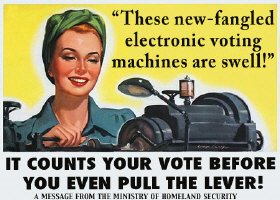
Hiya, kids! Hiya, hiya, hiya!
by Mxyzptlk
You know the old saw about the frog in a pot of water that, as the water gets hotter and hotter, doesn't realize he's going to get boiled alive until it's too late? Maybe that's where we stand with our democracy right now. The pot went on the burner with the un-Patriot Act, bubbles formed a year ago when the government permitted large swaths of shorefront property along the Gulf Coast to face re-development and gentrification, and steam was observed last week with passage of the McCain-Graham-Warner-Rolled-Over Act. Full boil may come on Election Day.
After the 2000 election there was a movement to replace then-current voting procedures with electronic machines that would be reliable and eliminate confusion.  The Help America Vote Act, passed in 2002, offered deadlines for migration to "improved" voting systems, but, along with various state laws, left county and municipal voting supervisors confused as to exactly what was required. The pressure to comply with these laws created a frenzy of voting machine purchases. These machines are, in many cases, not being specified and purchased by I.T. professionals. And certainly, they are not being operated by I.T. pros.
The Help America Vote Act, passed in 2002, offered deadlines for migration to "improved" voting systems, but, along with various state laws, left county and municipal voting supervisors confused as to exactly what was required. The pressure to comply with these laws created a frenzy of voting machine purchases. These machines are, in many cases, not being specified and purchased by I.T. professionals. And certainly, they are not being operated by I.T. pros.
Here are key findings in a Princeton University study of the popular Diebold voting machines:
1. Malicious software running on a single voting machine can steal votes with little if any risk of detection. The malicious software can modify all of the records, audit logs, and counters kept by the voting machine, so that even careful forensic examination of these records will find nothing amiss.
2. Anyone who has physical access to a voting machine, or to a memory card that will later be inserted into a machine, can install said malicious software using a simple method that takes as little as one minute. In practice, poll workers and others often have unsupervised access to the machines.
3.AccuVote-TS machines are susceptible to voting-machine viruses — computer viruses that can spread malicious software automatically and invisibly from machine to machine during normal pre- and post-election activity.*
4. While some of these problems can be eliminated by improving Diebold's software, others cannot be remedied without replacing the machines' hardware. Changes to election procedures would also be required to ensure security.
If you have 10 minutes to invest in learning more about this visit the Princeton site and watch their demonstration video. Their full report is available as well.
While there are many aspects of voting in America we should be concerned with, this danger is the most insidious. I think there's a role for the Carter Center right here at home.
Let's say we were a patient people. We could devise printed ballots that were clear, have them marked and dropped into boxes, and have the contents of those boxes counted and compiled. It might take longer, we might not have results the same night, but I wonder if those results would be any less accurate or more susceptible to fraud than the systems we will use this November 7th.
*Network connections are not necessary to spread viruses. Computer viruses were a problem long before the internet.
Sphere: Related Content




No comments:
Post a Comment